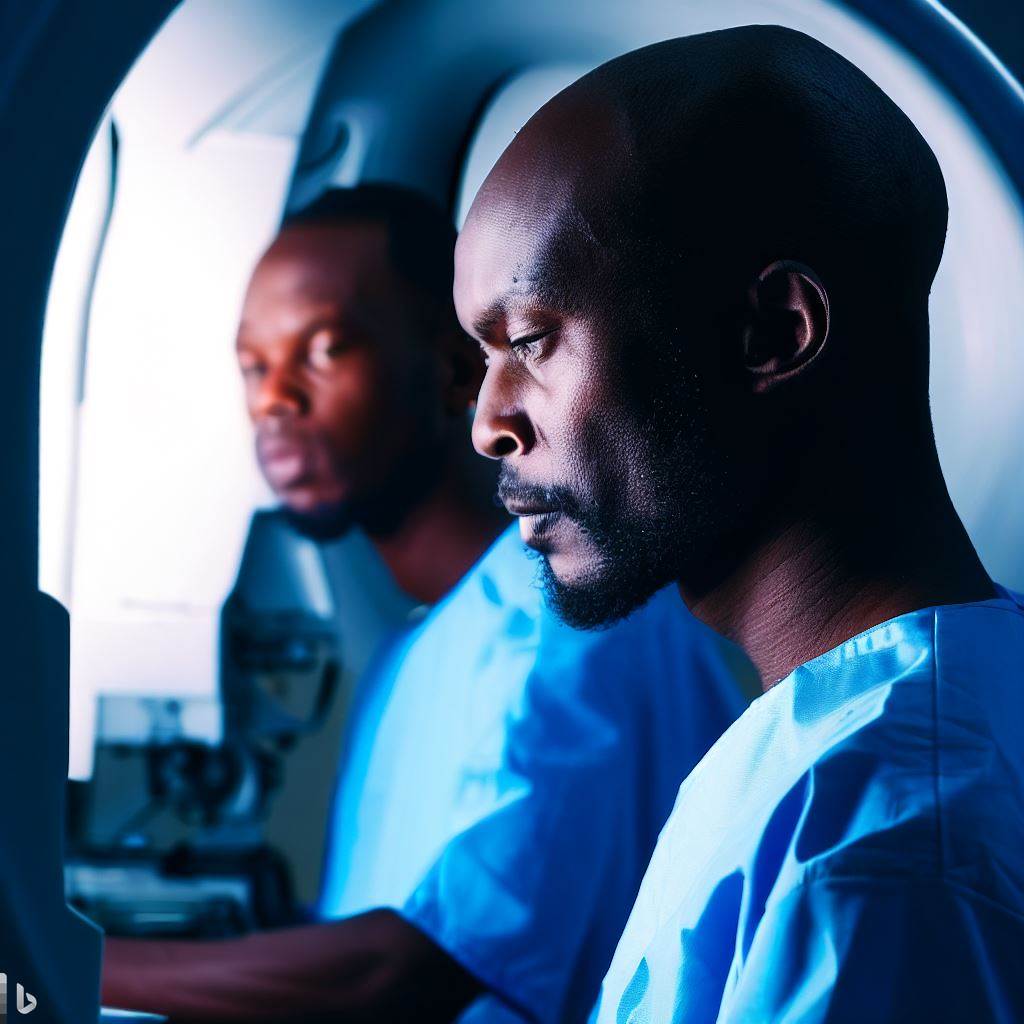Introduction
Speech-language pathology is a critical healthcare profession focused on diagnosing and treating communication disorders, playing a vital role in Nigeria’s healthcare system.
This field addresses a wide range of challenges that affect an individual’s ability to communicate effectively.
Communication disorders can have profound impacts on a person’s life, hindering their relationships, education, and overall well-being.
Speech-language pathologists (SLPs) work tirelessly to help individuals overcome these obstacles and improve their quality of life.
By evaluating speech, language, and swallowing difficulties, SLPs develop personalized treatment plans that cater to each individual’s unique needs.
They employ various techniques and technologies to enhance communication skills, such as articulation therapy, language intervention, and assistive communication devices.
In Nigeria, where communication disorders are prevalent, the role of speech-language pathology becomes even more crucial.
SLPs play an instrumental part in ensuring that people with communication challenges can actively participate in society, breaking down barriers to social interaction and academic achievement.
Overall, speech-language pathology is an indispensable profession that empowers individuals by enabling them to communicate effectively.
By embracing this field, aspiring speech-language pathologists can make a profound difference in the lives of many, contributing significantly to Nigeria’s healthcare landscape.
The need for speech-language pathology in Nigeria
Limited awareness and understanding of communication disorders
Nigeria faces a significant challenge when it comes to awareness and understanding of communication disorders.
Many individuals are unaware that communication disorders exist or do not fully grasp their impact on individuals’ lives.
This lack of awareness leads to stigmatization and misunderstandings.
High prevalence of communication disorders in Nigeria’s population
The prevalence of communication disorders in Nigeria is alarmingly high.
According to research, an estimated 3% to 6% of the population suffers from various communication disorders, including speech and language impairments.
This high prevalence highlights the urgent need for speech-language pathology services.
Lack of access to proper assessment and treatment services
One of the biggest challenges in Nigeria’s healthcare system is the lack of access to proper assessment and treatment services for communication disorders.
Many individuals, especially those in rural areas, do not have access to speech-language pathologists who can provide professional evaluations and interventions.
The consequences of these challenges are significant. Individuals with communication disorders often face difficulties in education, employment, and social interactions.
Without proper assessment and treatment, these individuals are at a higher risk of developing mental health issues and experiencing lower quality of life.
Solutions for addressing the need for speech-language pathology in Nigeria.
While the challenges are evident, there are potential solutions that can help improve the situation:
Increase awareness and understanding of communication disorders.
Educational campaigns and initiatives should be implemented to raise public awareness about communication disorders.
This can help reduce stigma and increase understanding of the impact of these disorders on individuals’ lives.
Strengthening training programs for speech-language pathologists
Investing in the training and education of speech-language pathologists is crucial.
By improving the knowledge and skills of professionals in this field, the quality of assessment and treatment services can be significantly enhanced.
Establishing speech-language pathology clinics in rural areas
Efforts should be made to establish speech-language pathology clinics in rural areas where access to proper assessment and treatment services is limited.
Mobile clinics or telecommunication systems can also be utilized to reach remote communities.
Collaboration between healthcare professionals
Collaboration between speech-language pathologists, doctors, psychologists, and educators can lead to a more comprehensive and holistic approach to treating communication disorders.
These professionals can work together to ensure individuals receive optimal care and support.
Educational support for individuals with communication disorders
Specialized educational programs and support systems should be developed to cater to the needs of individuals with communication disorders.
This can help them overcome barriers in education and improve their overall quality of life.
By addressing these solutions, Nigeria can take significant strides toward improving the availability and quality of speech-language pathology services.
Empowering individuals with communication disorders and providing them with the support they need can lead to better social, educational, and professional outcomes for the entire population.
Read: Exploring the Opportunities in Pediatric Optometry in Nigeria
The impact of speech-language pathology in Nigeria’s healthcare
In Nigeria, speech-language pathology plays a vital role in improving the overall healthcare system.
This field focuses on assessing, diagnosing, and treating individuals with communication and swallowing disorders.
Early intervention for children with speech and language disorders:
Early identification and intervention are crucial for children with speech and language disorders in Nigeria.
Speech-language pathologists work closely with children, their parents, and educators to improve communication skills and academic performance.
Through targeted therapy techniques, children can overcome their speech or language difficulties, enabling them to succeed academically and socially.
Additionally, speech-language pathology intervention enhances social interactions and emotional well-being, promoting overall growth and development in children.
Communication rehabilitation for adults with acquired communication disorders:
Adults who experience communication disorders due to stroke or head injuries greatly benefit from speech-language pathology intervention.
Speech-language pathologists assist these individuals in regaining their speech and language abilities through tailored therapy programs.
By targeting specific areas of difficulty, such as word retrieval or articulation, these professionals enable adults to effectively communicate with others.
Furthermore, individuals with neurological conditions like Parkinson’s disease or dementia receive support from speech-language pathologists, helping them maintain or regain their communication skills despite the challenges posed by their conditions.
Read: The Journey to Becoming a Registered Nurse in Nigeria
Voice therapy for individuals with voice disorders:
Voice disorders can significantly impact an individual’s quality of life and professional aspirations.
Speech-language pathologists provide voice therapy services to individuals with various voice disorders, such as vocal nodules or vocal cord paralysis.
By employing specialized techniques, individuals can regain a functional and healthy voice, allowing them to communicate effectively and participate in activities they enjoy.
Additionally, speech-language pathologists lend their expertise to professionals who heavily rely on their voice for their livelihood, such as teachers and singers, helping them maintain optimal vocal health and prevent voice-related complications.
Swallowing rehabilitation for individuals with swallowing disorders:
Swallowing disorders can have severe consequences for individuals, leading to malnutrition and aspiration pneumonia.
Speech-language pathologists play a crucial role in assessing and treating swallowing difficulties, ensuring individuals can safely swallow food and liquids.
Through swallowing rehabilitation techniques, these professionals help improve or restore normal swallowing function.
By addressing the underlying causes of the swallowing disorder, speech-language pathologists prevent complications and support individuals in maintaining their overall health.
In fact, speech-language pathology has a profound impact on Nigeria’s healthcare system.
Through early intervention for children with speech and language disorders, communication rehabilitation for adults with acquired communication disorders, voice therapy for individuals with voice disorders, and swallowing rehabilitation for individuals with swallowing disorders, speech-language pathologists greatly contribute to improving individuals’ quality of life.
Their expertise and services are essential in addressing communication and swallowing difficulties, promoting overall wellness and inclusivity in Nigeria’s healthcare landscape.
Read: Becoming a Speech-Language Pathologist: Nigerian Edition

Learn More: The Role of Nurses in Nigeria’s Healthcare System
Challenges in Implementing speech-language pathology services in Nigeria
In implementing speech-language pathology services in Nigeria, several challenges have been identified.
These challenges hinder the effective provision of care and support to individuals with communication and swallowing disorders.
The lack of qualified speech-language pathologists is a major obstacle in the field.
Limited number of qualified speech-language pathologists
The limited number of professionals trained in speech-language pathology in Nigeria is a pressing concern.
This is primarily due to the absence of specialized training programs offered in local universities and educational institutions.
As a result, aspiring speech-language pathologists often have to seek education and training abroad, leading to brain drain within the profession.
Read: The Path to Becoming a Surgeon in Nigeria
Cultural and language diversity affecting assessment and intervention
Cultural and language diversity also poses challenges to the assessment and intervention processes.
Nigeria is a country with diverse ethnic groups and languages.
In order to cater to the unique needs of each individual, speech-language pathologists need to provide culturally sensitive and linguistically appropriate services.
However, the limited availability of resources in local languages and dialects makes this task even more challenging.
Limited funding and resources allocated for speech-language pathology
Another significant challenge is the limited funding and resources allocated for speech-language pathology in Nigeria.
The importance of advocacy and policy support cannot be emphasized enough in addressing this issue.
It is crucial to raise awareness about the significance of speech-language pathology in healthcare and advocate for increased funding and resources allocation.
Collaboration with government bodies and non-governmental organizations can greatly contribute to overcoming this challenge.
In short, the implementation of speech-language pathology services in Nigeria is faced with various challenges.
The limited number of qualified professionals, cultural and language diversity, as well as the lack of funding and resources all impact the delivery of effective care.
Addressing these challenges requires the establishment of specialized training programs, provision of culturally sensitive and linguistically appropriate services, and strengthening advocacy efforts for increased support from the government and non-governmental organizations.
Read: Career Prospects for MRI Technologists in Nigeria
Success stories and notable projects in Nigerian speech-language pathology
Establishment of speech-language pathology programs and clinics
The impact of speech-language pathology in Nigeria’s healthcare system has been largely driven by the establishment of programs and clinics dedicated to this field.
Several universities and institutions across the country have developed specialized courses and degree programs in speech-language pathology.
This has allowed for the training and education of future speech-language pathologists who can contribute to addressing communication disorders in Nigeria.
Additionally, various clinics and centers have been set up to provide assessment, diagnosis, and treatment for individuals with speech and language difficulties.
This has not only increased access to services but has also created employment opportunities for professionals in this field.
Research initiatives to understand communication disorders in Nigerian context
Recognizing the importance of research, Nigerian speech-language pathologists have been actively involved in studying communication disorders within the Nigerian context.
Researchers are investigating the prevalence, causes, and impact of various communication disorders in different populations across the country.
They also explore culturally appropriate assessment and intervention strategies to ensure effective communication and inclusion for individuals with communication disorders.
These research initiatives contribute to the broader understanding of communication disorders, leading to improved interventions and outcomes for individuals in Nigeria.
Collaborative efforts with international organizations to enhance resources and training
Recognizing the need for collaboration and access to resources, Nigerian speech-language pathologists have established partnerships with international organizations.
Publish Your Professional Profile, Business or Brand
Showcase your expertise, gain trust, and boost visibility instantly on Professions.ng.
Publish NowThese collaborations aim to enhance resources, trainings, and professional development opportunities for speech-language pathologists in Nigeria.
International organizations provide support in terms of curriculum development, capacity building, and the provision of specialized equipment and materials.
Through these collaborations, Nigerian speech-language pathologists gain exposure to the latest advancements in the field, which in turn benefits their practice and the individuals they serve.
Overall, the success stories and notable projects in Nigerian speech-language pathology demonstrate the growing recognition of the field’s importance and its impact on healthcare.
The establishment of programs and clinics, research initiatives, and international collaborations all contribute to the development and advancement of speech-language pathology in Nigeria.
These efforts not only benefit individuals with communication disorders but also serve to strengthen the healthcare system as a whole.
As awareness and understanding of speech-language pathology continue to grow, it is expected that further success stories and impactful projects will emerge in the Nigerian context.
Read: Optometry and Vision Care Outreach in Nigeria
Conclusion
Speech-language pathology has made significant contributions to Nigeria’s healthcare, improving communication and swallowing disorders.
The government, healthcare sector, and society should provide more support, funding, and awareness to promote the growth and development of speech-language pathology in Nigeria.
With the potential for advancements in technology, training, and research, there is hope for further improvements in speech-language pathology in Nigeria’s healthcare system.
Therefore, it is crucial to prioritize speech-language pathology and invest in its infrastructure to ensure better healthcare outcomes for individuals with communication and swallowing disorders in Nigeria.
Let us work together to create a brighter future for speech-language pathology in Nigeria.




